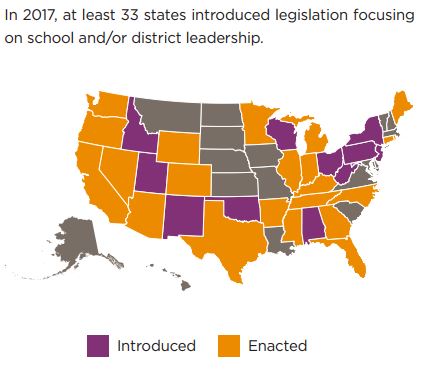A Big Push in States for PD, Leadership Skills for Superintendents, Principals

In state capitals around the country, lawmakers have placed a big emphasis this year on redoubling the leadership skills of school and district administrators, a focus that has implications for the K-12 market.
Legislators in at least 14 states, for instance, have introduced 24 bills to improve professional development for superintendents and principals, according to a new report by the Education Commission of the States. Thirteen of those proposals have made it into law.
Twenty-seven bills in at least 17 states have been introduced that focused on evaluations of superintendents and principals, and eight were enacted.
Additionally, 12 new laws have been enacted this year focused on certification and licensure of K-12 administrators. And eight laws were approved on preparation for K-12 administrators, according to ECS, a research and policy organization.
Much of the training and skill development being required by states will probably be provided by states — through leadership academies and other means — as well as by districts, nonprofit organizations, teacher colleges, and other sources, said Sara Shelton, the director of state relations for ECS.
The surge of interest can be attributed to a variety of factors, Shelton said. Those include a growing conviction (backed by some academic research) among state officials that strong leadership is tied to academic gains and a more stable teacher workforce.
“It’s something on the minds of state policymakers,” Shelton said. “They keep coming back to the idea that school leadership is really a catalyst for school improvement.”
Higher Standards, More Leeway
Other factors may also be at work. The Every Student Succeeds Act also opens the door to new strategies in professional development and places a new emphasis on PD for administrators, not just teachers. (The Trump administration has proposed cutting funding for the Title II program, a major vehicle for federal PD programs, though Congress has so far resisted his plan.)
Many state lawmakers seem interested in trying to create a “career continuum” to support teachers and administrators as they move through the K-12 pipeline, rather than just offering “piecemeal support” for them, observed Shelton,
ECS cites several examples of new laws that are coming at K-12 leadership from different angles.
In Mississippi, for instance, a new law will require district leaders to have at least six years’ experience, with three years of administrative experience as a principal in an “A”- or “B”-rated school.
Indiana is creating a new pilot program to give grants to districts that will provide teachers, principals, and administrators with mentoring. A Georgia law calls for planning a state leadership academy.
Some state efforts are aimed at creating more flexibility in how leaders are prepared. A new Texas law, ECS notes, will allow educator-prep programs to use formal observations of candidates’ work through electronic or tech-based means, not just in person.
See also:
